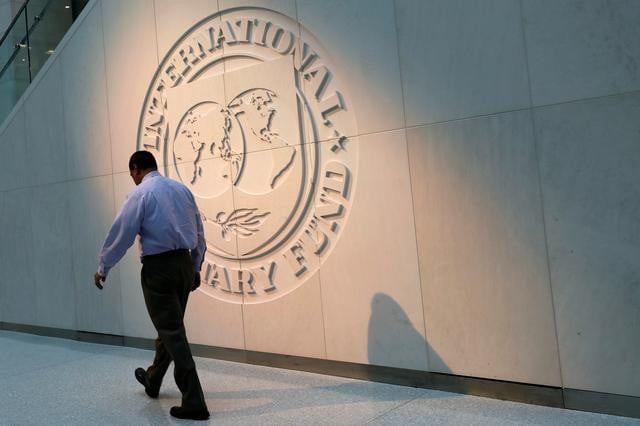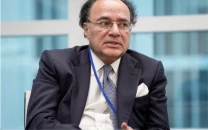Govt shares revised budget framework with IMF
Figure shows negative impact of hardly Rs55b on revenues

Despite the worst flood in the country‘s history and hundreds of billions of rupees in unbudgeted subsidies, Pakistan has initially projected only Rs990 billion fiscal slippages in this financial year, hardly showing a negative impact of Rs55 billion on its revenues.
Sources told The Express Tribune that Pakistan has shared the revised budget framework with the International Monetary Fund (IMF) amid the global lender’s apprehensions about the reliability of these figures.
The disagreement over the impact of the floods on the fiscal framework remains a key hurdle in the next visit by the IMF Mission to Pakistan for negotiations for the release of a $1.2 billion loan tranche.
The sources said that the discussions would take place on these numbers with the IMF and the government was open to revise the figures based on the input by the global lender.
They said the government had projected only Rs990 billion fiscal slippages -- of which Rs850 billion was only on account of higher debt servicing cost.
The overall budget deficit that the National Assembly had approved at Rs3.8 trillion was now projected at nearly Rs4.8 trillion, they added.
Despite the country witnessing the worst floods in its history, the coalition government has been signing off billions of rupees of unbudgeted cheques for exporters and farmers.
It also waived off Rs40 billion in revenue in favour of traders.
However, it has not shown any major slippage on account of non-interest expenses and tax revenues, turning the figures unrealistic.
The Federal Board of Revenue’s (FBR) collection projection has been kept unchanged.
The sources said almost the entire shock of Rs990 billion had been shown on the expenditures, with hardly Rs55 billion negative impact on the petroleum levy target.
Neither the finance ministry, nor the IMF resident representative responded to the requests for comments.
However, a government functionary said, off the record, that in the present circumstances the government would still have a primary budget surplus.
The primary budget surplus is calculated after excluding the interest payments.
There is a view that the government has overstated the interest expenses to Rs4.8 trillion up from Rs3.95 trillion approved in the budget.
The government has gone ahead with this move as the IMF does not trail the interest expense under its $6.5 billion programme.
The cushion availed on account of higher than the targeted interest expenses can be utilised to meet some other expenditures, said the sources.
However, the senior government functionary said that the interest expenses were bound to rise because of the 15% policy rate.
The sources said the government had told the IMF that there would be a primary budget surplus of Rs14 billion or 0.02% of the GDP as against the budgeted figure of Rs153 billion.
However, this assessment is contrary to the World Bank report that showed Pakistan’s primary deficit at 3% of the GDP.
The sources said the government had projected the total expenditures, inclusive of the provinces, at Rs15.1 trillion -- up by Rs934 billion.
They added that the current expenses were shown at Rs9.7 trillion -- up by Rs1.1 trillion.
However, the interest expenses are projected to be increased from Rs3.95 trillion to Rs4.8 trillion -- an excess spending of 21.5%.
The subsidies are the second component where the government has estimated a slippage of Rs240 billion -- up from Rs664 billion to Rs906 billion -- an excess of 36%.
Out of this Rs240 billion, Rs195 billion would be taken out of the annual provision for emergencies, said the sources.
The pension is the third current expenditure head where the annual cost has been projected to increase by Rs25 billion to Rs634 billion.
The federal development expenditures have been slashed by Rs175 billion to Rs469 billion, according to the sources.
The reset of the expenses have been kept unchanged.
The major assumptions are made in the revenue collection, where the FBR's target has been kept unchanged at Rs7.47 trillion despite the board informing the finance ministry that the half-year target could be missed by a margin of Rs150 billion.
The petroleum levy collection is projected at Rs855 billion despite a mere Rs47 billion collection during the first three months of the current fiscal year.
The government is hopeful that it will collect at least Rs400 billion petroleum levy on account of petrol alone in the remainder period of the current fiscal year at the current rates.
The State Bank profit is projected at Rs371 billion -- Rs71 billion higher than budgeted estimates.
The rest of the revenue estimates have been kept unchanged.
The federal budget deficit widened by 43% to over Rs1 trillion in the first quarter of the current fiscal year as the rise in expenditure more than doubled the pace of gross revenues because of the uncontrolled spending on debt servicing.



















COMMENTS
Comments are moderated and generally will be posted if they are on-topic and not abusive.
For more information, please see our Comments FAQ